Greek gastronomy and food of Greece
Introduction to Greek Gastronomy
Welcome to a culinary journey through the sun-kissed lands of Greece and its mesmerizing islands! Get ready to tantalize your taste buds with the vibrant flavors and rich history of Greek gastronomy. From traditional dishes passed down through generations to contemporary twists on classic recipes, there’s something for every food enthusiast to savor in this Mediterranean paradise. Join us as we explore the diverse and delicious world of Greek cuisine!
Overall, Greek cuisine’s significance lies in its historical and cultural heritage, its emphasis on fresh and healthy ingredients, its connection to nature, and its role in social and culinary traditions. It continues to captivate people with its flavors, authenticity, and the sense of community it fosters.
The Greek food throughout its history and continuing today is for the Greeks a philosophy, they know that what makes a perfect feast is not just the food but also the good company. Food is nearly always prepared with the tastes of the guests in mind, should the dishes be roasted or fried, light or heavy? and the wine carefully chosen. Much of the conversation at the dinner table centres amicably around the food.
The freshness of the fish , having just leapt from the sea; the vegetables newly dug from the ground or picked from the vines of the local farmers. The host will want to proudly point out how they have attempted to provide the best and freshest produce for you to enjoy.
The traditional day in Greece begins early with a quick breakfast of coffee, milk or tea with dried rusks or toast, followed by a substantial lunch around 14.00-15.00 pm. Dinner served around 8-10 pm with mainly Greek dishes.
During the evenings, not only in weekends but also during week days the Greeks love to eat out mainly in a small local tavern or a grill house, with the family or with friends. Strong distinctive tastes are the hallmark of this culinary rhythm. Herbs like rigani (oregano), thyme, rosemary, parsley, coriander, dill, fennel and sage; spices such as cinnamon, nutmeg, pepper, vanilla and mastic are all crucial.
Greek gastronomy is a true reflection of the rich history, diverse culture, and stunning landscapes that make up Greece and its islands. From traditional dishes like moussaka and souvlaki to unique island specialties such as Santorini’s fava beans and Mykonos’ kopanisti cheese, Greek cuisine offers a culinary experience like no other.
Historical overview
Greek food stands as a vibrant testament to the country’s rich historical and cultural heritage, weaving a tapestry of flavors and traditions that have been shaped by millennia of history, geography, and the interchange of diverse cultures. At the heart of Greek culinary tradition lies a philosophy that emphasizes freshness, simplicity, and seasonality, underpinned by the abundant use of olive oil, grains, wine, fruits, and vegetables native to the Mediterranean basin.
The roots of Greek cuisine can be traced back to ancient times, with documented recipes and dietary practices that highlight the importance of bread, olives, and wine in the daily diet, alongside a variety of fruits, vegetables, and meats. This ancient diet, known as the Mediterranean diet today, is celebrated for its health benefits and balance, showcasing a way of eating that is both sustainable and deeply connected to the land and sea.
The historical evolution of Greek cuisine has been influenced by the many civilizations that have flourished in the region, including the Romans, Byzantines, and Ottomans. Each left its mark, introducing new ingredients, spices, and cooking methods that were absorbed and adapted into the fabric of Greek culinary practices. The Byzantine era, for example, saw the introduction of complex spices and sweet pastries, while the Ottoman influence is evident in dishes like moussaka and baklava, highlighting the deep interweaving of cultural influences.
Greek cuisine is also a reflection of the country’s geographical diversity, with regional variations that speak to the local climate, terrain, and history. The islands, with their access to fresh seafood, offer a plethora of dishes centered around fish and shellfish, seasoned with herbs like oregano and thyme that grow wild in the arid landscape. In contrast, the mountainous regions rely more on meats, cheeses, and hearty vegetables, showcasing a different aspect of Greek culinary diversity.
Central to Greek culture is the concept of philoxenia, or hospitality, which is deeply embedded in the culinary traditions. Meals are often social occasions, meant to be shared with family and friends, accompanied by lively conversation and the sharing of food, which is considered a gesture of friendship and respect. This sense of communal eating is epitomized in the traditional Greek meze, a collection of small dishes that are shared among the table, fostering a sense of community and belonging.
The religious and seasonal festivals of Greece also play a significant role in the culinary calendar, with special foods and dishes prepared to mark these occasions. From the fasting foods of Lent to the sweet bread of Easter (tsoureki) and the honey and nuts of Christmas treats, these culinary traditions are interwoven with the religious and cultural fabric of the country, marking the passage of time and the continuity of heritage.
Today, Greek cuisine continues to evolve, embracing both tradition and innovation, as chefs and home cooks alike explore new ways to celebrate the country’s culinary heritage while responding to contemporary tastes and dietary trends. Yet, at its core, Greek cuisine remains a celebration of quality ingredients, simple preparations, and the joy of sharing a meal, reflecting the enduring spirit and cultural richness of Greece.
Traditional Greek Dishes and Ingredients
Greek cuisine is a flavorful tapestry woven with traditional dishes and fresh ingredients that reflect the rich history of the country. One iconic dish is moussaka, a baked casserole layered with eggplant, minced meat, and creamy béchamel sauce. Souvlaki, skewered and grilled meat served in pita bread with tzatziki, is a popular street food enjoyed by locals and tourists alike.
Spanakopita, a savory pastry filled with spinach and feta cheese wrapped in crispy phyllo dough, showcases the Greek love for simple yet delicious flavors. Dolmades are grape leaves stuffed with herbed rice or ground meat—a bite-sized delight bursting with Mediterranean aromas. Olive oil, lemon juice, oregano, and garlic are key ingredients that elevate Greek dishes to culinary perfection.
Indulge in baklava’s sweet layers of nuts and honey or savor a slice of galaktoboureko—custard-filled pastry soaked in syrup. Whether you’re craving hearty stews like stifado made with tender beef or fresh seafood grilled to perfection—the diversity of Greek cuisine promises a gastronomic adventure worth exploring.
The Influence of Geography and Culture on Greek Food
The rich tapestry of Greek gastronomy is intricately woven with the threads of geography and culture. The diverse landscapes of Greece, from the fertile plains to the rugged mountains and sun-kissed islands, play a vital role in shaping its culinary traditions.
In mainland Greece, you’ll find hearty dishes like moussaka and souvlaki influenced by centuries-old farming practices. The abundance of olive groves provides the golden elixir that flavors many Greek dishes.
On the islands, seafood takes center stage in delicacies like grilled octopus and fresh fish mezedes. The proximity to the sea influences island cuisine with a bounty of seafood served simply to highlight its freshness.
Greek cuisine is also deeply rooted in history and tradition, with recipes passed down through generations. From celebratory feasts to everyday meals, food plays a central role in Greek culture – bringing families together around the table to savor each bite with joy and gratitude.
Regional Variations in Greek Cuisine
When it comes to Greek cuisine, regional variations play a significant role in showcasing the diverse flavors and culinary traditions across the country. From the hearty dishes of Northern Greece influenced by Balkan flavors to the seafood-centric fare of the islands in the Aegean Sea, each region offers a unique gastronomic experience.
In Northern Greece, you can taste dishes like moussaka and pastitsio with a twist that reflects its proximity to countries like Bulgaria and Turkey. The use of spices like cinnamon and allspice sets their cuisine apart.
Moving south to Crete, known for its healthy Mediterranean diet, you’ll find an abundance of olive oil, fresh vegetables, and herbs like oregano and thyme. Cretan cuisine is characterized by simplicity yet bursting with flavor.
The Ionian Islands boast Venetian influences seen in their pasta dishes paired with local seafood. Corfu’s pastitsada—a spicy meat dish served over pasta—is a must-try specialty not found elsewhere in Greece.
Delicious Greek Island Specialties
When it comes to Greek Island specialties, you’re in for a treat like no other. Each island boasts its own unique flavors and dishes that will leave your taste buds craving more. From the seafood delights of Crete to the savory cheese pies of Sifnos, there’s something for every palate.
In Santorini, don’t miss out on trying delicious fava dip made from yellow split peas or the mouthwatering tomatokeftedes – fried tomato balls bursting with flavor. Head over to Mykonos for a taste of louza, a cured pork dish seasoned with spices that will leave you wanting seconds.
On the island of Corfu, be sure to sample pastitsada – a hearty pasta dish cooked in spicy tomato sauce with tender meat. And let’s not forget about Rhodes where you can indulge in pitaroudia – crispy chickpea fritters perfect for snacking by the sea.
Greek Island specialties offer a culinary journey like no other, showcasing the diverse and exquisite flavors that make each destination truly unforgettable!
Vegan and Vegetarian Options in Greek Food
Greek cuisine is a paradise for vegans and vegetarians, offering a plethora of delectable options that celebrate fresh produce and bold flavors. From hearty salads bursting with ripe tomatoes, cucumbers, olives, and feta cheese to crispy falafel wraps stuffed with creamy tzatziki sauce, there’s no shortage of plant-based delights waiting to be savored.
For those seeking a taste of authenticity without meat or dairy, traditional dishes like spanakopita (spinach pie) and dolmades (stuffed grape leaves) provide a satisfying blend of herbs and spices wrapped in flaky phyllo dough. And let’s not forget the beloved moussaka – layers of eggplant, potatoes, and savory lentils topped with a velvety béchamel sauce.
Indulge in the simplicity of grilled vegetables drizzled with olive oil and sprinkled with oregano or dive into a bowl of creamy hummus paired with warm pita bread. With its emphasis on wholesome ingredients sourced from the land and sea, Greek cuisine offers an array of vegan and vegetarian options sure to tantalize your taste buds.
Must-Try Drinks in Greece
When it comes to experiencing the true essence of Greece, exploring its rich culinary scene is a must. And what better way to dive into Greek culture than by indulging in some refreshing and flavorful drinks?
One iconic beverage that you simply can’t miss out on is Ouzo. This anise-flavored liquor is a staple in Greek dining, often enjoyed as an aperitif or paired with meze dishes.
For those looking for something non-alcoholic, try a glass of traditional Greek coffee. Strong and aromatic, this brew will awaken your senses and provide a taste of local customs.
Another popular drink is Retsina, a white wine infused with pine resin that adds a unique twist to your wine-drinking experience.
And let’s not forget about Frappé, the beloved iced coffee that has become synonymous with laid-back moments under the Mediterranean sun.
So when in Greece, be sure to savor these must-try beverages that are sure to enhance your gastronomic adventure!
Tips for Exploring Greek Food on Your Next Trip
When exploring Greek food on your next trip, be sure to venture beyond the tourist areas. Wander down charming side streets and pop into local tavernas where you’ll find authentic dishes made with love.
Don’t shy away from trying new ingredients or flavors. Be adventurous and sample traditional dishes like moussaka, souvlaki, and spanakopita. You might discover a new favorite dish!
Take advantage of the abundance of fresh produce in Greece. Indulge in juicy tomatoes, crisp cucumbers, flavorful olives, and creamy feta cheese that will elevate your dining experience.
Engage with locals and ask for their recommendations. They can point you towards hidden gems and off-the-beaten-path eateries where you can savor delicious homemade meals.
Immerse yourself in the culinary culture by participating in cooking classes or food tours. Learn about traditional cooking methods and techniques while enjoying hands-on experiences that will deepen your appreciation for Greek cuisine.
Whether you are a meat lover, a seafood enthusiast, or a vegan/vegetarian traveler, there is something for everyone in Greek food. The use of fresh local ingredients combined with age-old recipes passed down through generations creates flavors that will tantalize your taste buds and leave you craving more.
As you explore the different regions of Greece, you’ll discover how geography and culture have influenced each area’s culinary traditions. From the olive groves of Peloponnese to the vineyards of Crete, every bite tells a story of this beautiful Mediterranean country.
And let’s not forget about the drinks! Whether it’s sipping on ouzo by the sea or enjoying a glass of Assyrtiko wine while watching the sunset over the Aegean Sea, Greek beverages add another layer to this gastronomic journey.
So pack your bags, book your ticket to Greece, and get ready to embark on an unforgettable culinary adventure. With so much delicious food waiting for you to try, your taste buds will thank you for choosing Greece as your next travel destination. Opa!
Mediterranean Ingredients
Greek cuisine showcases an abundance of fresh and locally sourced ingredients. Olives, olive oil, feta cheese, yogurt, honey, vegetables, herbs (such as oregano, thyme, and rosemary), and seafood are central to Greek dishes. These ingredients reflect the Mediterranean climate and the emphasis on simplicity, quality, and seasonality.
Meze Culture
Meze refers to a variety of small dishes served as appetizers or shared plates. Meze culture is an integral part of Greek dining, encouraging a convivial and social atmosphere. Popular meze dishes include tzatziki (yogurt and cucumber dip), dolmades (stuffed grape leaves), fava (yellow split pea dip), and various grilled or marinated vegetables.
Traditional Greek Dishes
Greek cuisine boasts several iconic dishes that have stood the test of time. Moussaka, a layered dish of eggplant, ground meat, and béchamel sauce, is a classic example. Other notable dishes include souvlaki (grilled skewered meat), spanakopita (spinach and feta pie), pastitsio (baked pasta with meat sauce), and baklava (sweet pastry with nuts and honey syrup).
Culinary Influences
Greek cuisine has been influenced by various cultures throughout history. The Byzantine and Ottoman empires brought new spices, flavors, and cooking techniques to Greece. Middle Eastern influences can be seen in dishes like tzatziki and baklava, while Italian influences are evident in dishes like pastitsio and
Greek cuisine’s historical and cultural heritage is a testament to the country’s rich culinary traditions, reflecting the influences of ancient civilizations, religious customs, regional diversity, and a focus on fresh and flavorful ingredients. It continues to evolve while maintaining its deep roots in the past.
Polular Greek food
Moussaka
Moussaka is a delicious dish that originates from the Mediterranean region, particularly Greece. It is a layered casserole dish made with eggplant (aubergine), ground meat (usually lamb or beef), and a rich tomato sauce. It is often topped with a creamy béchamel sauce and baked to perfection.
The traditional preparation of moussaka involves several steps. First, the eggplants are sliced and either fried or grilled until they become soft and slightly browned. Meanwhile, the ground meat is cooked with onions, garlic, and spices such as cinnamon, allspice, and oregano. The tomato sauce is then added to the cooked meat mixture, creating a flavorful filling.
To assemble the moussaka, a layer of cooked eggplant slices is placed at the bottom of a baking dish. The meat mixture is spread over the eggplant, followed by another layer of eggplant slices. Finally, a creamy béchamel sauce is poured over the top, and the dish is baked in the oven until the sauce is golden and bubbly.
Moussaka is often served as a main course and is typically accompanied by a fresh salad and crusty bread. It is a hearty and comforting dish that combines the flavors of the Mediterranean with layers of textures and aromas. Variations of moussaka can be found in different countries, but the Greek version is the most well-known and beloved.
It’s worth noting that while the traditional moussaka recipe includes meat, there are also vegetarian or vegan variations available, where the meat is substituted with ingredients like lentils or mushrooms. These alternatives can be just as delicious and satisfying for those with dietary restrictions or personal preferences.
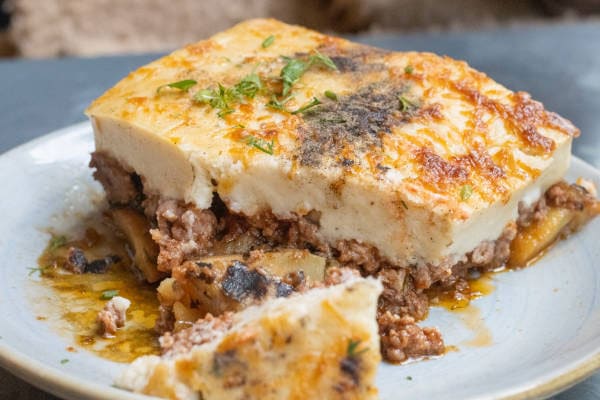
Greek Salad
Greek salad, also known as “Horiatiki” in Greek, is a popular and refreshing dish that originates from Greece. It is a simple yet flavorful salad made with fresh ingredients typically found in the Mediterranean region. The key components of a Greek salad include:
The Greek salad is more than just a dish; it’s a reflection of Greek culture and hospitality. Often served as a starter, side dish, or even a light meal, it exemplifies the Greek tradition of sharing food and enjoying the simple pleasures of life. It’s common to see the salad served with crusty bread to soak up the delicious olive oil and juices, making every bite a delight.
In essence, the Greek salad is a testament to the enduring appeal of Greek cuisine, offering a taste of the Mediterranean that is both timeless and universally loved. Its simplicity, nutritional value, and delicious flavors continue to make it a staple on tables around the world, inviting everyone to partake in the rich culinary heritage of Greece.
To prepare a Greek salad, simply combine the tomatoes, cucumbers, red onions, bell peppers, and olives in a large bowl. Crumble the feta cheese on top. In a separate bowl, whisk together olive oil, red wine vinegar, salt, and pepper to make the dressing. Drizzle the dressing over the salad and toss gently to combine. Garnish with fresh herbs and serve chilled.
Greek salad is often enjoyed as a light and refreshing meal on its own or as a side dish alongside grilled meats, pita bread, or other Mediterranean dishes. It’s a perfect choice for summer or when you’re craving a healthy and flavorful salad option.
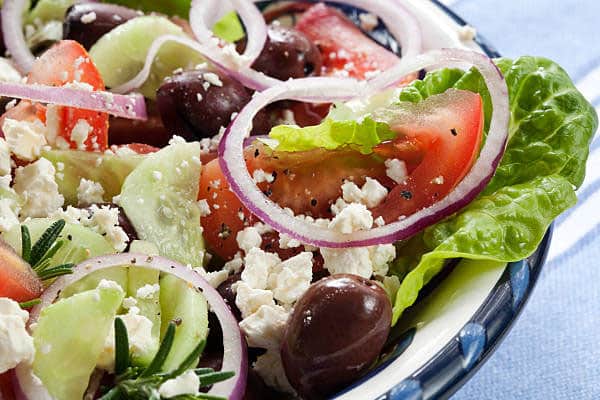
Souvlaki
Souvlaki is a popular Greek dish consisting of small pieces of meat, typically pork, skewered and grilled to perfection. The word “souvlaki” actually refers to the skewer itself, but it has come to represent the entire dish as well.
Traditionally, souvlaki is made by marinating the meat in a mixture of olive oil, lemon juice, garlic, and various herbs and spices. The marinated meat is then threaded onto skewers and cooked on a charcoal grill or over an open flame, resulting in a deliciously smoky and flavorful dish.
Souvlaki is often served with pita bread, tzatziki sauce (a yogurt-based sauce with cucumber and garlic), and a variety of accompaniments such as tomatoes, onions, and sometimes fries. It’s a popular street food in Greece and is enjoyed as a quick and tasty meal.
While pork is the most common meat used in souvlaki, other meats like chicken, beef, and lamb can also be used. Additionally, there are variations of souvlaki found in different regions of Greece, each with its own unique twist on the marinade and serving style.
Overall, souvlaki is a beloved Greek dish known for its simplicity, bold flavors, and the delightful combination of grilled meat, fresh vegetables, and tangy sauce.

Spanakopita
Spanakopita is more than just a savory pastry; it is a celebration of Greek culinary heritage, combining simple ingredients in a way that is both sophisticated and deeply satisfying. Its popularity extends far beyond the borders of Greece, inviting people around the world to savor a piece of Greek tradition that is as delicious as it is timeless.
Spanakopita also reflects the adaptability and regional diversity of Greek cooking. Variations of the dish can include different greens such as Swiss chard or leeks, and some versions incorporate other cheeses alongside or instead of feta. Each variation maintains the essential character of spanakopita while showcasing local ingredients and preferences, illustrating the dynamic nature of Greek culinary traditions.
Moreover, spanakopita embodies the Greek philosophy of making the most of seasonal produce, a principle that underpins much of Greek cuisine. The use of fresh spinach and herbs highlights the importance of freshness and seasonality, ensuring that the dish is both nutritious and flavor
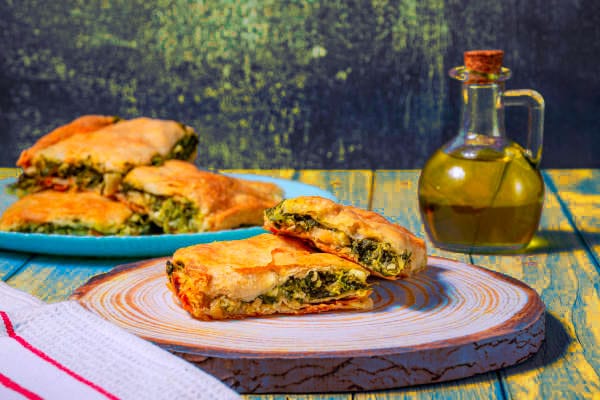
Dolmades
Dolmades, also known as dolmas, are a traditional Greek and Middle Eastern dish consisting of stuffed grape leaves. The word “dolma” comes from the Turkish word “dolmak,” which means “to stuff” or “to fill.” Dolmades are typically made by rolling a filling of rice, herbs, and sometimes meat or vegetables in grape leaves, creating small bite-sized rolls.
The filling for dolmades varies depending on regional and personal preferences. Traditional fillings often include rice, herbs like parsley and dill, onions, and sometimes ground meat such as lamb or beef. Vegetarian or vegan versions may exclude meat and incorporate ingredients like mushrooms, tomatoes, or other vegetables.
To make dolmades, grape leaves are blanched in boiling water to soften them before using. A spoonful of filling is placed in the center of each leaf, and then the leaf is folded and rolled tightly into a small cylindrical shape. The rolled dolmades are usually arranged in a pot or baking dish, then cooked by steaming or simmering in a flavorful liquid such as broth or lemon juice.
Dolmades can be served warm or at room temperature as an appetizer, side dish, or part of a mezze platter. They are often garnished with lemon wedges, drizzled with olive oil, and paired with yogurt or tzatziki sauce. Dolmades are popular not only in Greece and the Middle East but also in many other countries with Mediterranean and Balkan culinary influences.
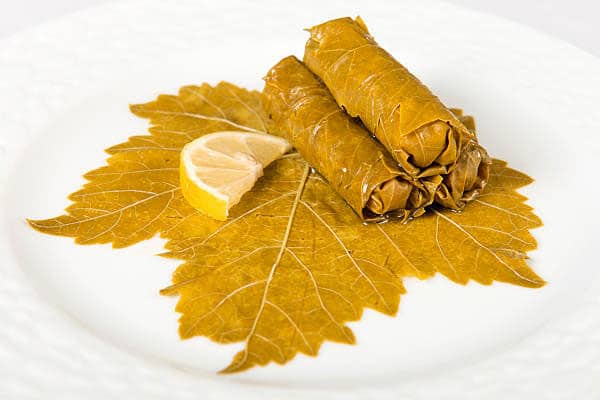
Tzatziki
Tzatziki is a quintessential Greek dip that epitomizes the freshness and flavor profile characteristic of Greek cuisine. Made from a simple yet harmonious blend of strained yogurt, grated cucumber, garlic, olive oil, and often a touch of lemon juice and dill, tzatziki is a versatile condiment that complements a wide range of dishes. Its cool, creamy texture and refreshing taste make it a beloved staple not only in Greece but around the world, where it has been embraced for its delightful combination of flavors and its ease of preparation.
At the heart of tzatziki is the yogurt, which is traditionally made from sheep’s or goat’s milk in Greece, offering a richer texture and tangier taste compared to cow’s milk varieties. The yogurt is strained to remove excess water, resulting in a thick, creamy base that is both luscious and light. The addition of grated cucumber, which is squeezed to remove its juice, contributes a crisp, refreshing quality that balances the yogurt’s creaminess.
Garlic adds a pungent kick to the dip, its robust flavor mellowed slightly by the yogurt, while olive oil lends a smooth richness that ties all the components together. Lemon juice provides a bright acidity, and dill, when used, introduces a subtle herby note that complements the cucumber and yogurt beautifully. The ingredients are mixed together until well combined, creating a dip that is at once creamy, crunchy, tangy, and fragrant.
Tzatziki’s appeal lies in its versatility. It is commonly served as a dip with pita bread, fresh vegetables, or as part of a meze platter, a selection of small dishes that are shared at the beginning of a meal. Tzatziki also makes an excellent accompaniment to grilled meats and fish, its cool, tangy flavor providing a refreshing contrast to the smoky, savory notes of the barbecue. In Greece, it is often served alongside souvlaki or gyros, adding a creamy, cooling element to these popular street foods.
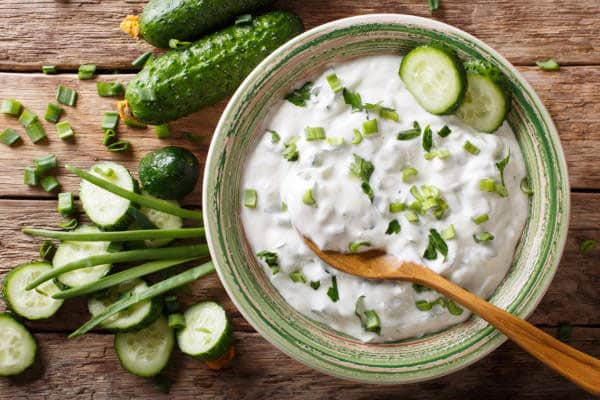
Feta cheese
Feta cheese is a popular type of cheese that originates from Greece. It is traditionally made from sheep’s milk or a mixture of sheep’s and goat’s milk, although nowadays, it can also be made with cow’s milk. Feta cheese has a crumbly texture and a tangy, salty flavor.
The production of feta cheese involves curdling milk with the addition of rennet, which helps separate the curds and whey. The curds are then cut into small pieces and allowed to drain, removing most of the whey. After draining, the curds are salted and placed in brine, which contributes to the distinctive flavor and preservation of the cheese.
Feta cheese is commonly used in Mediterranean cuisine and is a key ingredient in dishes such as Greek salads, spanakopita (spinach pie), and pastries like tiropita. It can also be crumbled and sprinkled on top of various dishes as a flavorful topping.
When purchasing feta cheese, you can find it in blocks or already crumbled. It is important to note that authentic feta cheese is made in Greece and is protected by a European Union PDO (Protected Designation of Origin) designation, meaning that only cheese made in specific regions of Greece can be labeled as “feta.” However, similar cheeses made in other countries or using different methods may also be referred to as “feta-style” or “feta-like” cheese.
Feta cheese is a versatile ingredient that adds a unique flavor to a variety of dishes, and it can be enjoyed by itself or as part of a larger recipe.
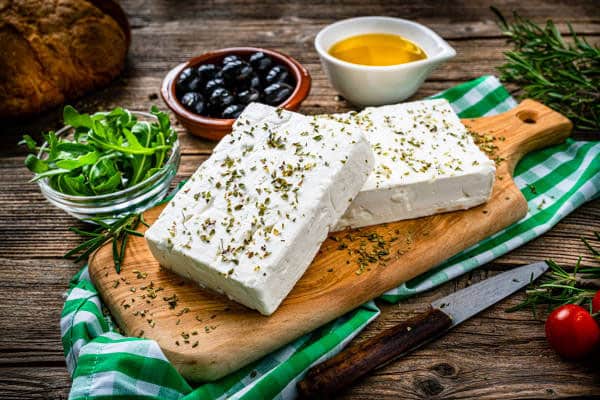
Giouvetsi
Giouvetsi is a cherished traditional Greek dish that embodies the warmth and simplicity of Mediterranean cuisine. This baked casserole combines tender, slow-cooked meat, typically lamb, beef, or chicken, with orzo pasta or sometimes kritharaki (rice-shaped pasta), all immersed in a rich, flavorful tomato-based sauce. Infused with the aromatic essences of onion, garlic, and bay leaves, and often enhanced with a sprinkle of cinnamon or allspice, Giouvetsi is a heartwarming meal that exudes the comfort and generosity of Greek home cooking.
The preparation of Giouvetsi is a testament to the principles of Greek cuisine, which values the slow layering of flavors and the use of fresh, quality ingredients. The meat is first browned to develop depth of flavor, then simmered gently with tomatoes and spices until it becomes wonderfully tender. The orzo is added to the same dish, absorbing the savory juices and tomato sauce, and the entire concoction is baked to perfection. The result is a harmonious blend of textures and tastes, with the pasta offering a delightful contrast to the succulence of the meat.
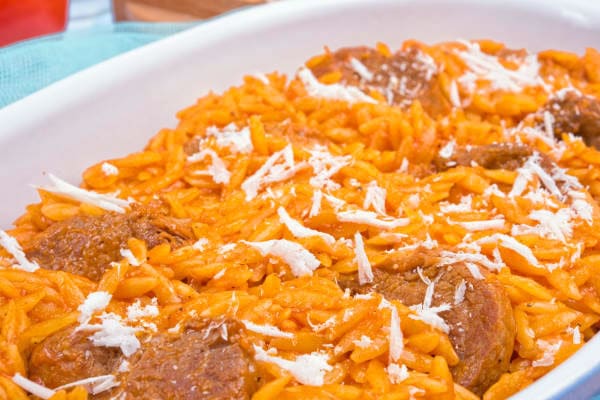
Greek yogurt
In Greek cuisine, yogurt is more than just a breakfast food or a healthy snack; it’s an integral component of both sweet and savory dishes. It serves as a base for tzatziki, a cooling dip made with cucumber and garlic, and is a key ingredient in traditional Greek desserts like yogurt cake and honey-thyme yogurt. Greek yogurt can also be found in marinades, where its acidity tenderizes meats, and in sauces to add creaminess and flavor.
Internationally, Greek yogurt has been embraced for its versatility and health benefits. It can be used as a healthier alternative to sour cream or mayonnaise in dips and spreads, added to smoothies for a protein boost, or enjoyed with fruit and honey for a simple yet satisfying dessert. Its ability to blend with a variety of flavors and ingredients has made it a staple in health-conscious kitchens.
The rise of Greek yogurt on the global stage reflects a broader trend towards foods that are not only nutritious but also flavorful and fulfilling. Its journey from a traditional Greek staple to an international superfood underscores the global appetite for foods that can bridge cultures, offering a taste of the Mediterranean that enriches diets worldwide. Greek yogurt’s enduring appeal lies in its combination of taste, texture, and nutritional benefits, making it a timeless addition to the culinary landscape.
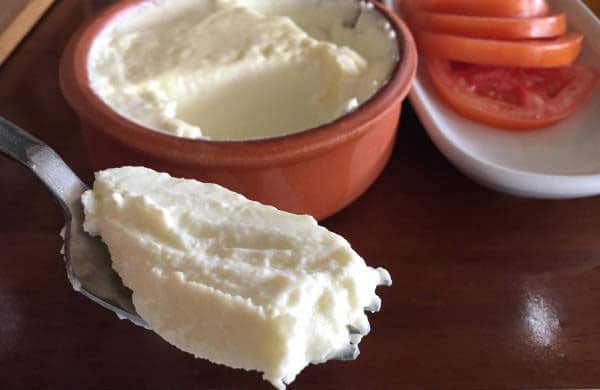
Baklava
Baklava is a sweet pastry that is popular in various Middle Eastern, Mediterranean, and Balkan cuisines. It is made by layering thin sheets of phyllo dough with a mixture of finely chopped nuts (typically walnuts, pistachios, or almonds), sugar, and spices, such as cinnamon or cardamom. The layers are then baked until golden and crispy.
After baking, a sweet syrup made from sugar, water, and lemon juice or rose water is poured over the hot baklava, allowing it to soak and infuse with flavor. The syrup adds moisture and sweetness to the pastry, making it irresistibly delicious.
Baklava is known for its distinctive diamond or triangle shape, which is achieved by cutting the baked pastry into individual pieces before serving. It is often garnished with additional chopped nuts or a sprinkle of ground cinnamon.
This delightful dessert has a rich history dating back centuries and is enjoyed as a special treat during holidays, celebrations, and other festive occasions. Its unique combination of flaky pastry, crunchy nuts, and sweet syrup makes it a beloved dessert in many cultures around the world.

Mediterranean health food in Greece
Pleasure, simplicity and good friends you can trust were central to his theory of life. The Romans during the period of the Roman Empire continued this tradition, but to enormous excess. Evidence of this are seen in the many famous feasts held during this time. This element of excess was and still is at odds with the Greek temperament, and was eliminated by the later Byzantines, thus preserving the authenticity of Greek cuisine for over a thousand years. Basically the traditional diet and method of cooking food in Greece has not changed since the ancient times, the original flavours and ingredients are still used along with the crucial basic ingredient of all – Greek olive oil.
Cholesterol is largely found in animal fats and people with high levels are more prone to suffer from heart disease than those with lower levels. Greek cuisine is largely free from animal fats which is why it is so good for us. This, together with fresh, organic foodstuff, large helpings of fish, fruit and vegetables with very little opportunity for fast food binges and no real tradition of making do with pre-cooked TV dinners leads us to conclude that it is not really surprising that as well as being the cradle of civilization it was also the birthplace of the Mediterranean Diet. Today, with the introduction of nouveau cuisine in much of Western Europe – with its strange mix of ingredients and flavours, or the cuisine of some European cities with its pretentiousness, complicated etiquette procedures and formalities it seems that all gastronomical pleasure has been lost. In Greek cuisine you can rediscover the original feeling of taste. The Greek food is beautiful! And when I say Greek food I don’t mean souvlaki and moussaka, but the hundreds and hundreds of wonderful dishes that Greek women have invented through time.
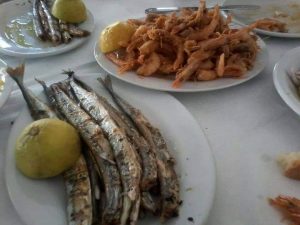
Step two is to eat the way the Greeks do. You start by ordering in mezes, or mezedakia. These are the small dishes with various delicacies that you eat as appetisers or on the side. You can even remain there and not order a main course at all. Order whatever comes to mind, or ask the waiter to bring in whatever is good. With this you should drink wine, but beer or a soft drink is OK too. Dig in, and enjoy. Take your time…the Greeks do not just eat out for the food, but for the company and the fun of it. Worth to try are the Greek desserts and the famous Greek salads like, Horiatiki the well known Greek salad ,Melitzanosalata, Angourontomata, Maroulosalata, taramosalata and many others.
What to order in a Greek Restaurant

Taramosalata, the Greek red caviar and then usually fried aubergines, zucchinis or fried green paprika followed by Tyropitakia (small cheese pies) and various croquettes from cheese (Tyrokroketes), zucchini balls flavoured with fresh mind (kolokythokeftedes), dolmadakia gialantzi (stuffed wine leaves) and of course Chorta ( boiled Greek dandelions or radishes).

Meat Dishes

The fish dishes are the best ones as Greece is a country surrounded by the sea and fishing is a main factor of the Greek agriculture. But fish dishes are the tricky ones for the foreigners and tourist because in many Greek taverns the fishes are spelled wrongly and many west and north European tourists doesn’t know so well the fishes of the Mediterranean.
Greek wines
Wine was for the Ancient Greek the drink of the Gods, still today the Greek wine is for the Greeks the most popular drink. Among the most popular wines in Greece is the Retsina a wine that for the foreigner is you love it or you hate it. Retsina is one of the most older wines in Greece and its name and taste comes from the resin that they put in. Its popularity comes from 2 reasons the good taste and the cheap price, Stil today in Athens you van find places and taverns that sale Greek wine from the Barrel. Other popular wines in Greece are Kokineli and Brusco, red dry house wines (the Greeks refer to brusco as dry red and not sparkling as the Italian Brusco) (sweet wines) Mavrodafni of Patras (the sweet Greek Dessert Port wine), Muscat of Samos or Samiotiko. There are many kinds and appellations of white and red wines in Greece among them are Agioritiko ,Macedonikos , Naoussa, Robola of Kefalonia, Zitsa ,Santorini , Rhodes Peza, Gumenissa and others.
Liquors and Aperitifs
Greek drinking culture dates back thousands of years, intertwined with mythology, rituals, and celebrations. In ancient Greece, symposiums brought people together to drink wine and engage in philosophical discussions. The act of sharing a drink symbolized friendship and camaraderie among Greeks. Throughout history, Greek liquors like ouzo and tsipouro have been enjoyed during social gatherings and traditional festivities. These drinks are deeply rooted in Greek tradition, often passed down through generations.
Drinking in Greece is not just about consuming alcohol; it’s a way to connect with others and savor the moment. From toasting “Yamas” (cheers) to enjoying a leisurely meal with friends or family, drinking plays a central role in Greek social interactions.
Today, Greek drinking customs continue to thrive, reflecting the country’s rich cultural heritage and love for good company. Whether it’s sipping on an aromatic glass of ouzo by the sea or sharing raki shots at a taverna, Greek drinking remains an integral part of everyday life.
Ouzo : Is the best Greek aperitif well known all over the world for its special flavor of anise, among the best ouzo are the ones from Samos and Lesvos island some of the ouzo you can ask in Greece is Mini, Giokarinis, Plomari and Ouzo 12. Ouzo its a drink that most Greeks will drink with meze ,if you are in an island try as meze grilled octopus or salted macerel, always something salty goes well with ouzo. You can drink Ouzo straight but the best way is to mix it with water. Metaxa a world famous Greek Brandy, it has a rather sweet taste and you can find it as 3, 5 or 7 stars.
Even though recreating foreign dishes at home is difficult, you can give the recipes here a go. They are not too hard, and if made right, will take you back to that lovely place by the sea.
